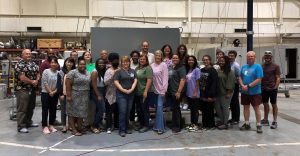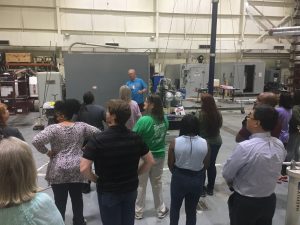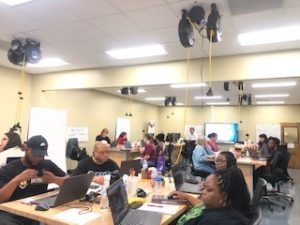ECE Professor Leads Teacher Workshops
September 9, 2021
 Dr. Jean Mohammadi-Aragh, Electrical and Computer Engineering (ECE) Assistant Professor, recently helped lead a group of elementary, middle, and high school teachers in a National Science Foundation (NSF) STEM+C program this summer to learn about computational thinking and 3D weather. The group included 15 teachers from MSU’s surrounding area, as well as eight facilitators from a variety of STEM departments at MSU.
Dr. Jean Mohammadi-Aragh, Electrical and Computer Engineering (ECE) Assistant Professor, recently helped lead a group of elementary, middle, and high school teachers in a National Science Foundation (NSF) STEM+C program this summer to learn about computational thinking and 3D weather. The group included 15 teachers from MSU’s surrounding area, as well as eight facilitators from a variety of STEM departments at MSU.
The project, titled Integrating Computational Science Practice, Weather Data Analysis, and 3D Visualization in the Secondary Earth and Environmental Science Curriculum, teaches middle and high school teacher to learn about computational thinking and helps them incorporate it into their current lessons.
“Computational thinking is an important skill that engineering and computing students must master in order to be successful. Early awareness and training in computational thinking is key, but there are few engineering and computer science classes that are taught in elementary and middle school,” said Dr. Mohammadi-Aragh. The team developed the idea to integrate computational thinking into basic science courses.
Dr. Mohammadi-Aragh added “I think it’s an exciting idea to test out – and so far, the feedback from our participating teachers has been positive. I think we’ve come up with a novel way to teach computational thinking skills to teachers with a wide range of backgrounds.”
Computational practices and thinking are needed to model, visualize, and communicate engineering and science information. Participants in the project designed, developed, and tested eight learning modules that will help middle and high school teachers learn about computational thinking and be able to incorporate it into their current lessons.
The group focused on 11 computational thinking skills with the categories of visualization and spatial skills, pattern recognition, complexity management, and generalization. During the summer workshop, the teachers were able to use 3D weather and meteorology as the discipline within which to teach computation thinking skills due to the familiarity of weather.
The Principal Investigator (PI) of this NSF grant is Dr. Yan Sun, an assistant professor of Instructional Systems and Workforce Development (ISWD). Co-PIs on the project are Dr. Mohammadi-Aragh; Dr. Jamie Dyer, Professor of Geosciences; Jonathan Harris, Outreach Coordinator for the Northern Gulf Institute. Additional support for the program was provided by post-doctoral research Pat Ko, and graduate students Mengni Bai of ISWD, Chase Robinson of ECE, and Jolie Kavanagh of Geosciences.
For more information about Dr. Mohammadi-Aragh and her research, visit here.
The Department of Electrical and Computer Engineering at Mississippi State University consists of 23 faculty members (including 7 endowed professors), 3 clinical faculty, 10 professional and support staff, and over 700 undergraduate and graduate students with approximately 88 being at the Ph.D. level. With research expenditure of the department in excess of $10M, the department houses the largest High Voltage Laboratory among North American Universities. For more detailed information on the department please visit our website www.ece.msstate.edu.

ECE High Voltage Lab Manager David Wallace Guides Participants

Workshop Participants Engaged in Instruction

Teachers Learning Classroom Practices
